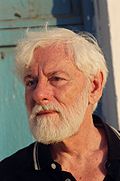In the summer of 1940, when the Germans overran Northern France and occupied Paris, the French surrendered. France was divided into two parts: the North, with Paris, remained under direct German occupation, the South was granted autonomy. A venerable marshal, Henri Petain, a hero of World War I, was appointed leader of the non-occupied zone, the capital of which was set up in the provincial town of Vichy.
A lone French general resisted the surrender. Charles de Gaulle, with a small band of adherents, fled to London, where he tried by radio to arouse the French people to resist. The effect was negligible.
Against expectations, the British continued the war ("Alright then, alone!") and the German regime in France became inevitably harsher and harsher. Hostages were executed, Jews deported, Vichy became more and more a byword for collaboration with the enemy. Slowly the "resistance" gained ground. In the end, the Allies invaded France, the Germans occupied the Vichy territory and were vanquished, de Gaulle returned as a victor. Petain was sentenced to death but not executed.
Opinions about Petain were divided, and still are. On the one hand, he saved Paris from destruction and saved the French people from many of the cruelties of the Nazis. After the war, France recovered quickly, while other countries were in ruins.
On the other hand, Petain is regarded by many as a traitor, a former hero who collaborated with the enemy in wartime and turned resistance fighters and Jews over to the Nazis.
OF COURSE, different historical situations cannot be equated. Israelis are harsh occupiers, but they are no Nazis. Abu Mazen certainly is no second Petain. But some comparisons may be in order.
One way to judge a policy is to ask: what are the alternatives?
It is no exaggeration to say that all forms of Palestinian resistance have been tried and found wanting.
In the beginning, some Palestinians dreamt of Indian-style civil disobedience. It failed completely. Palestinians are no Indians, and the occupation army, which has no real antidote to civil disobedience, simply started to shoot, compelling the Palestinians to turn to violence.
Violence failed. The Israeli side enjoys infinite military superiority. With the help of informers and torture, Palestinian underground cells are regularly uncovered, including the last one this week.
Many Palestinians hope for international intervention. This has been prevented by successive US administrations, all of which served the occupation on request of the US Jewish establishment. Sympathizers of the Palestinian cause, such as the international boycott movement (BDS) are far too weak to make much of a difference.
The Arab countries are good at making declarations and proposing plans, but largely unwilling to help the Palestinians in any real way.
What remains? Precious little.
ABU MAZEN believes -- or pretends to believe -- in "international pressure." Many Israeli peace activists, despairing of their own people, have reached the same conclusion.
With a lot of patience, Abbas is slowly gathering points at the UN. This week, the Palestinian flag was raised at the UN headquarters among the flags of member nations. This has raised national pride (I remember a similar event in our own past), but does not really change anything.
Abbas may also hope that the growing personal antagonism between President Obama and Prime Minister Netayahu will induce the Americans to withhold their veto in the Security Council the next time a resolution against the occupation comes up. I doubt it. But if so -- the Israeli government will just ignore it. The same will happen if Abbas succeeds in getting some Israeli officers indicted for war crimes at the International Criminal Court. Israelis believe only in "Facts on the Ground."
(Note: You can view every article as one long page if you sign up as an Advocate Member, or higher).





